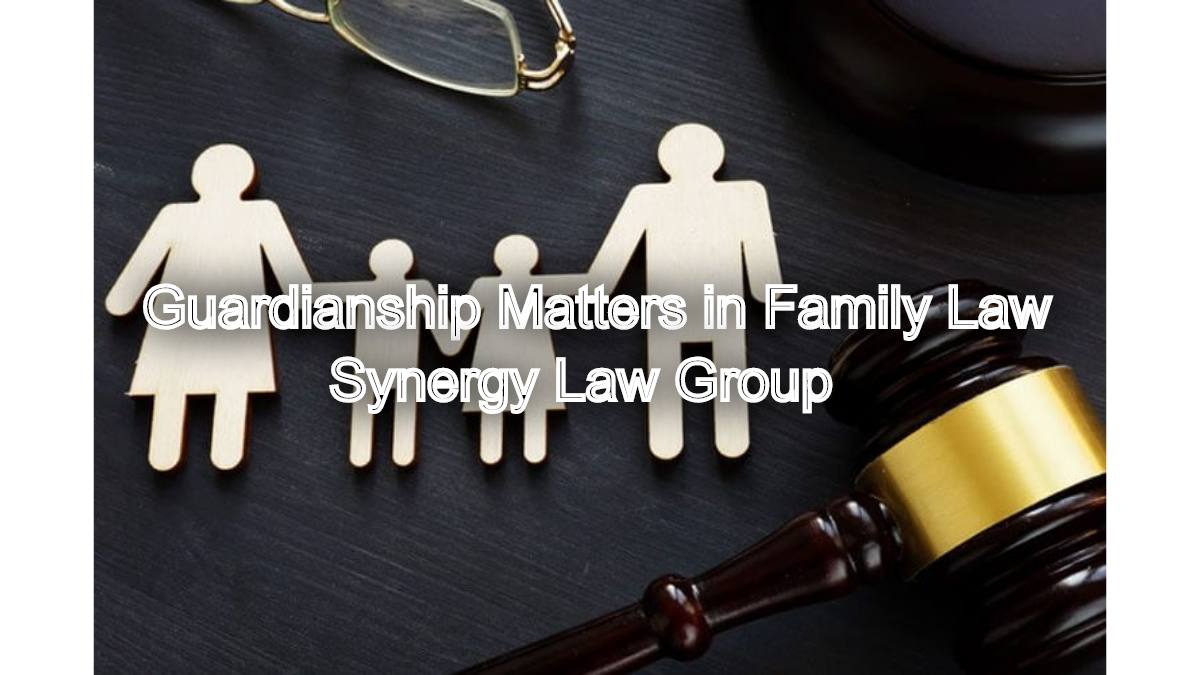Null and Void Marriages: Marriage is a significant social and legal institution. It creates rights and obligations between two individuals. However, not all unions recognized as marriages are legally valid. Some marriages are considered null and void from their inception. This means that, in the eyes of the law, these marriages never existed. Synergy Law Group | Family Court Law Firm possesses extensive experience in family law. Our top-ranking family court attorneys offer crucial legal insights into the complexities of null and void marriages. We guide individuals through these sensitive matters with expertise and understanding.
Unraveling Invalid Unions: Legal Insights on Null and Void Marriages
Understanding the Concept of Nullity: Marriages That Never Were
A null and void marriage is distinct from a voidable marriage. A voidable marriage is valid until a decree of nullity is passed by a court. On the other hand, a null and void marriage is invalid from the very beginning. It does not require a court order to be deemed invalid. However, often, parties seek a decree of nullity from a family court. This provides a formal legal declaration that the marriage was never valid. This declaration clarifies the legal status of the parties involved.
Grounds for Nullity: Legal Impediments to Valid Marriage
Several legal grounds can render a marriage null and void. These grounds are typically defined by the specific laws governing marriage in a jurisdiction.
Firstly, prior subsisting marriage is a common ground for nullity. If one of the parties was already legally married at the time of the subsequent marriage, the later marriage is automatically void. Bigamy, the act of having two spouses at the same time, is illegal. Consequently, any marriage entered into while a valid prior marriage exists is considered null.
Secondly, prohibited degrees of relationship can also lead to a marriage being null and void. Marriage laws often specify certain blood or affinity relationships within which marriage is not permitted. For instance, marriages between siblings or parents and children are universally prohibited. Therefore, unions within these prohibited degrees are considered incestuous and are void from the outset.
Thirdly, lack of legal capacity in either party can render a marriage null. Legal capacity refers to the mental and physical ability to enter into a contract, including marriage. For example, if one of the parties was of unsound mind at the time of the marriage and incapable of giving valid consent, the marriage may be considered null. Similarly, if a party was below the legal age of marriage, the union might be void ab initio, depending on the specific laws.
Furthermore, non-compliance with essential legal formalities can, in some cases, lead to a marriage being declared null and void. Marriage laws often prescribe specific rituals and registration procedures that must be followed for a marriage to be legally valid. While minor procedural irregularities might not invalidate a marriage, a complete disregard for essential formalities could result in nullity.
The Role of the Family Court: Seeking a Decree of Nullity
Even though a null and void marriage is invalid from its inception, it is often prudent to obtain a formal decree of nullity from a family court. This legal declaration provides conclusive proof of the marriage’s invalidity. Moreover, it helps to clarify the legal status of the parties, especially concerning issues like property rights and the status of any children born from the union. Furthermore, a decree of nullity can prevent future legal complications and provide closure to the individuals involved.
The process of seeking a decree of nullity involves filing a petition in the family court. The petitioner needs to provide evidence establishing the grounds for nullity. The court will then issue notice to the other party. After hearing both sides and examining the evidence, the court will pass a judgment either declaring the marriage null and void or dismissing the petition if the grounds are not sufficiently proven.
Legal Consequences of Null and Void Marriages
The legal consequences of a marriage being declared null and void are significant. Since the law considers such a marriage as never having existed, the parties are not legally considered husband and wife. Consequently, they do not acquire the rights and obligations that arise from a valid marriage.
Firstly, there is no obligation for spousal support or alimony in a null and void marriage. Since the legal status of marriage never came into being, the financial obligations that arise upon divorce do not apply.
Secondly, the rules of inheritance that apply to legally married couples do not apply to parties in a null and void marriage. Neither party has a legal claim to the other’s property based on their marital status.
Thirdly, the status of children born from a null and void marriage is a crucial consideration. In many jurisdictions, laws protect the legitimacy of children born from void marriages. These children are often considered legitimate, and both parents have a legal obligation to support them. The decree of nullity typically addresses the custody and maintenance of such children.
Furthermore, issues related to property acquired during the void union need to be resolved. Since there was no valid marriage, the concept of jointly owned marital property might not automatically apply. The court will likely consider the individual contributions of each party in determining the ownership and division of assets.
Distinguishing Null and Void from Voidable Marriages
It is crucial to distinguish between null and void marriages and voidable marriages. As mentioned earlier, a voidable marriage is valid until it is annulled by a court decree. There are specific grounds that can make a marriage voidable, such as lack of free consent due to fraud or coercion, impotence of one of the parties, or pregnancy of the wife by someone other than the husband at the time of marriage without the husband’s knowledge. Unlike a null and void marriage, a voidable marriage exists in law until a decree of annulment is passed. The legal consequences for voidable marriages, such as the possibility of spousal support and the treatment of marital property, can differ from those of null and void marriages.
The Importance of Expert Legal Counsel
Navigating the complexities of null and void marriages requires the expertise of a seasoned family court attorney. Synergy Law Group | Family Court Law Firm provides top-ranking legal counsel in these sensitive matters. Our attorneys possess a deep understanding of the relevant marriage laws and the procedures involved in seeking a decree of nullity. We provide comprehensive legal guidance to our clients. We help them understand their rights and obligations. Assist them in gathering the necessary evidence. We represent them effectively in court proceedings. Our goal is to provide clear, compassionate, and effective legal solutions to individuals facing issues related to the validity of their marriage.
Frequently Asked Questions: Null and Void Marriages
A1: A marriage is considered null and void from its beginning if there was a fundamental legal impediment at the time of the marriage. Common reasons include one party already being legally married (bigamy), the parties being within prohibited degrees of relationship (incest), or one party lacking the legal capacity to marry (e.g., unsound mind). Legally, such a marriage never existed.
A2: A null and void marriage is invalid from the start and requires no court order to be deemed so, though a decree of nullity is often sought for clarity. A voidable marriage, on the other hand, is legally valid until a court annuls it based on specific grounds like lack of free consent or impotence.
A3: Generally, since a null and void marriage is considered never to have existed, the typical rights and obligations of marriage, such as spousal support and inheritance, do not apply.
A4: While a null and void marriage is legally invalid without a court order, obtaining a decree of nullity from a family court is highly advisable.
A5: In many jurisdictions, laws protect the legitimacy of children born from null and void marriages. These children are often considered legitimate, and both parents typically have a legal obligation to provide for their care and maintenance. The court issuing the decree of nullity usually addresses the custody and financial support of such children.
Conclusion: Seeking Clarity and Resolution in Invalid Unions
In conclusion, null and void marriages are legal anomalies – unions that are considered never to have existed in the eyes of the law due to fundamental legal impediments. Understanding the grounds for nullity and the legal consequences is crucial for individuals involved in such unions. Seeking a decree of nullity from a family court provides a formal legal declaration and helps to resolve related issues such as property rights and the status of children. Synergy Law Group | Family Court Law Firm, with its team of top-ranking family court attorneys, is dedicated to providing expert legal insights and representation in matters of null and void marriages. We strive to guide our clients towards clarity and resolution, ensuring their legal rights are protected and their futures are secured.
Read More
- Restraining Orders and Legal Protection Against Narcissistic Abusers
- Resolve Marital Issues with Chennai’s Best Counseling Advocates: Legal & Emotional Support
- NRI Divorce Matters: Expert Family Court Advocate’s Expertise
- Mutual Consent Divorce: Expert Family Court Lawyer’s Guidance
- Muslim Divorce Procedures: Top Rated Family Court Advocate’s Supportive Approach
- Department of Justice, Government of India:










